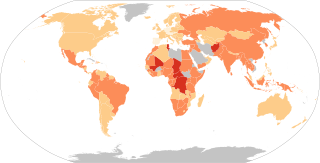Related Research Articles

The United States Air Force Academy (USAFA) is a United States service academy in El Paso County, Colorado, immediately north of Colorado Springs. It educates cadets for service in the officer corps of the United States Air Force and United States Space Force. It is the youngest of the five service academies, having graduated its first class 65 years ago in 1959, but is the third in seniority. Graduates of the academy's four-year program receive a Bachelor of Science degree and are commissioned as second lieutenants in the U.S. Air Force or U.S. Space Force. The academy is also one of the largest tourist attractions in Colorado, attracting approximately a million visitors each year.
Sexual assault is an act in which one intentionally sexually touches another person without that person's consent, or coerces or physically forces a person to engage in a sexual act against their will. It is a form of sexual violence that includes child sexual abuse, groping, rape, drug facilitated sexual assault, and the torture of the person in a sexual manner.
The Aberdeen Scandal was a military sexual assault scandal in 1996 at Aberdeen Proving Ground, a United States Army base in Maryland.

Sexual assault in the United States armed forces is an ongoing issue which has received extensive media coverage in the past. A 2012 Pentagon survey found that approximately 26,000 women and men were sexually assaulted that year; of those, only 3,374 cases were reported. In 2013, a new Pentagon report found that 5,061 troops reported cases of assault. Of the reported cases, only 484 cases went to trial; 376 resulted in convictions. Another investigation found that one in five women in the United States Air Force who were sexually assaulted by service members reported it, for one in 15 men.

Women have been serving in the military since the inception of organized warfare, in both combat and non-combat roles. Their inclusion in combat missions has increased in recent decades, often serving as pilots, mechanics, and infantry officers.
Rape is a type of sexual assault initiated by one or more persons against another person without that person's consent. The act may be carried out by physical force, under threat or manipulation, by impersonation, or with a person who is incapable of giving valid consent.
Rape by gender classifies types of rape by the sex and/or gender of both the rapist and the victim. This scope includes both rape and sexual assault more generally. Most research indicates that rape affects women disproportionately, with the majority of people convicted being men; however, since the broadening of the definition of rape in 2012 by the FBI, more attention is being given to male rape, including females raping males.
Statistics on rape and other sexual assaults are commonly available in industrialized countries, and have become better documented throughout the world. Inconsistent definitions of rape, different rates of reporting, recording, prosecution and conviction for rape can create controversial statistical disparities, and lead to accusations that many rape statistics are unreliable or misleading.

Rape is a type of sexual assault involving sexual intercourse or other forms of sexual penetration carried out against a person without their consent. The act may be carried out by physical force, coercion, abuse of authority, or against a person who is incapable of giving valid consent, such as one who is unconscious, incapacitated, has an intellectual disability, or is below the legal age of consent. The term rape is sometimes used interchangeably with the term sexual assault.

As defined by the United States Department of Veterans Affairs, military sexual trauma (MST) are experiences of sexual assault, or repeated threatening sexual harassment that occurred while a person was in the United States Armed Forces.

Lieutenant General Michael Carl Gould is a retired senior officer of the United States Air Force who served as the 18th Superintendent of the United States Air Force Academy. He assumed command on June 9, 2009, and retired from service in July 2013. He previously served as director of operations and plans, United States Transportation Command, Scott Air Force Base. Gould is a command pilot with more than 3,000 hours in a variety of aircraft.

The rate of sexual violence in South Africa is among the highest recorded in the world. Police statistics of reported rapes as a per capita figure has been dropping in recent years, although the reasons for the drop has not been analysed and it is not known how many rapes go unreported. More women are attacked than men, and children have also been targeted, partly owing to a myth that having sex with a virgin will cure a man of HIV/AIDS. Rape victims are at high risk of contracting HIV/AIDS owing to the high prevalence of the disease in South Africa. "Corrective rape" is also perpetrated against LGBT men and women.
Rape in the United States is defined by the United States Department of Justice as "Penetration, no matter how slight, of the vagina or anus with any body part or object, or oral penetration by a sex organ of another person, without the consent of the victim." While definitions and terminology of rape vary by jurisdiction in the United States, the FBI revised its definition to eliminate a requirement that the crime involve an element of force.

The Invisible War is a 2012 American documentary film written and directed by Kirby Dick and produced by Amy Ziering and Tanner King Barklow about sexual assault in the United States military. It premiered at the 2012 Sundance Film Festival, where it received the U.S. Documentary Audience Award. The film has been lauded by advocates, lawmakers, and journalists for its influence on government policies to reduce the prevalence of rape in the armed forces.
The United States Air Force Basic Training scandal is the military sex scandal which took place at Lackland Air Force Base in San Antonio, Texas. The scandal involved 43 female trainees allegedly victimized by their instructors during and after basic military training beginning in 2009. Seventeen male instructors were accused of offenses ranging from the solicitation of improper relationships to rape, and 35 instructors were removed from their posts pending an investigation. Nine of the accused instructors belonged to the 331st Training Squadron, and squadron commander Lt. Col. Mike Paquette was removed from command in June 2012 because of the problems in his unit. In August 2012 Col. Glenn Palmer, commander of the 737th Training Group, was also relieved from his position due to the scandal.
Sexual Assault Prevention and Response (SAPR) is a US military training program designated to educate service members and to provide support and treatment for their families who have experienced any form of sexual assault. The SAPR program provides treatment and support including, medical, counseling, and direct guidance in navigating through the Uniform Code of Military Justice (UCMJ). This program runs in accordance with United States Department of Defense Instruction 6495.02 – SAPR program procedures. Generally anyone who is entitled to receive care at a military treatment facility is also eligible to receive care and support through SAPR. Each branch of the military has adapted the SAPR program and each branch has a SAPR point of contact.

There have been women in the United States Air Force since 1948, and women continue to serve in it today.
After a sexual assault or rape, victims are often subjected to scrutiny and, in some cases, mistreatment. Victims undergo medical examinations and are interviewed by police. If there is a criminal trial, victims suffer a loss of privacy, and their credibility may be challenged. Victims may also become the target of slut-shaming, abuse, social stigmatization, sexual slurs and cyberbullying. These factors, contributing to a rape culture, are among some of the reasons that may contribute up to 80% of all rapes going unreported in the U.S, according to a 2016 study done by the U.S. Department of Justice.

SHARP is a proactive U.S. Army program which aims to end sexual harassment and assault in the service. Sexual harassment is a crime in the armed forces, under the UCMJ Article 134 by executive order on 26 January 2022. Those accused of a crime such as sexual harassment,or assault are subject to the UCMJ. Victims of such crimes are protected from disciplinary action, or prosecution by Army Directive as of 2022. A Special Trial Counsel, part of the Judge Advocate General's Corps has been established to combat harmful behaviors, in order to conduct independent prosecutions.

Sexual harassment in the military is unwanted sexual behaviour experienced as threatening, offensive, or otherwise upsetting, which occurs in a military setting.
References
- ↑ Graney, David W. (2010). Rogue institution: vigilante injustice, lawlessness, and disorder at the Air Force Academy (1st ed.). Tucson, AZ: Wheatmark. ISBN 9781604943955.
- ↑ "Air Force Inspector General Summary Report Concerning The Handling Of Sexual Assault Cases At The United States Air Force Academy" (PDF). 14 September 2004. Archived from the original (PDF) on 13 May 2009. Retrieved 25 May 2009.
- 1 2 "Rate of Rape at Academy Is Put at 12% in Survey". The New York Times. 28 August 2003. Retrieved 28 March 2005.
- ↑ "Air Force Ignored Academy Abuse". The New York Times. 23 September 2003. Retrieved 28 March 2005.
- ↑ Shanker, Thom (8 December 2004). "Commanders Are Faulted on Assaults at Academy". The New York Times. Retrieved 21 April 2010.
- ↑ Bonnie S. Fisher; Francis T. Cullen; Michael G. Turner (December 2000). "The Sexual Victimization of College Women" (PDF). National Institute of Justice. DoJ. Archived (PDF) from the original on 2 May 2006. Retrieved 31 May 2006.
- ↑ Shanker, Thom (19 March 2005). "Pentagon Sets New Policy on Reporting Sex Assaults at Academies". The New York Times. Retrieved 21 April 2010.
- ↑ "No punishment recommended in sex assault scandal". Rocky Mountain News. 26 March 2005. Archived from the original on 2005-03-27. Retrieved 28 March 2005.
- ↑ Tom Roeder, "Air Force Academy Rape Case is Dropped", Colorado Springs Gazette, Sep. 30, 2006. Archived 2007-07-10 at the Wayback Machine
- ↑ "Academy Sex Assault Case Won't Go to Civilian Court", Air Force Times, 12 Jan 2007.